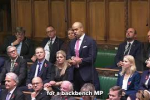
The cycle is doomed to repeat itself until leading figures conduct a robust discussion on the cultural aspect of the crisis
A rare sunny weekend in August should be an opportunity to once again enjoy the wide-open spaces we have learnt not to take for granted over the past eighteen months. However, this weekend the sight of a police cordon and the departure of the Air Ambulance provided a sobering reminder of the grim realities of life in the part of North London where I live. A crisis that has been forgotten about by many in the wake of the pandemic. A 16-year-old boy lay in critical condition, having been stabbed multiple times in an attack within Lordship Recreation Ground. Not just the latest victim of serious youth violence, but of casual indifference.
There have been five separate murders in the constituency of Tottenham this year, four fatal stabbings and one shooting - a spate of violent killings that spanned the first half of the year. The list of victims and the circumstances of their deaths paints a troubling picture of social decay, but an even starker image is painted by the ages of those arrested. Of the 14 charged with murder in Haringey so far this year, almost all have been children, the youngest only 14 years old. The lack of outrage amongst local residents is telling.
Alongside other public health issues that have fallen by the wayside, the focus upon serious youth violence has been another forgotten casualty of the pandemic. Fatal knife attacks in London fell by 30 per cent last year as a result of the reduced interaction during lockdown. Knife offences in general fell by over 20 per cent, but as predicted by senior police officers, the gradual easing of restrictions has seen an inevitable rise in knife crimes. Whilst the numbers are dwarfed by the rolling tally of infections and deaths from the virus, the artificial lull created by lockdown has allowed focus to wander.
So where is David Lammy in the midst of this crisis? The Labour MP for Tottenham holds an almost celebrity level of profile. One of the most recognisable MPs in the country, he is better known than almost everyone else in the Shadow Cabinet, and quite possibly the actual Cabinet too. He has been MP for Tottenham for two decades. He has three-quarters of a million Twitter followers, a weekly radio show on LBC, has made TV documentaries for Channel 4 and has written two books. His current brief is somewhat ironically as Shadow Justice Secretary; though perhaps on this issue more Shadow than Justice. Incredibly there has been no public acknowledgement from Lammy regarding any of the murders or violent attacks that have occurred in his constituency this year.
When questioned about the reason for his silence on the issue he provided no explanation. A recent letter from him in response to the issue simply pointed the finger at a lack of funding before curtly suggesting writing to the Prime Minister instead. A bizarre delegation of duty given Lammy is the MP, but until it gives him the social media traction he thrives on, it is unlikely to attract his attention.
He has given any number of grandiloquent Cri de Coeurs on Windrush and Grenfell, captured and clipped for viral impact; his brand very much depends upon it. Yet amidst this passion and fury, there is seemingly no time to highlight the plight of those families among his constituents torn apart by tragic and needless violence.
The toxic culture that has fostered an environment where carrying a knife is not only acceptable, but seemingly a necessity, is yet to be seriously addressed. Entertainment media that cynically valorises the most negative aspects of black culture, celebrating criminality whilst gaslighting communities by blaming perceptions upon institutional racism, continues to provide a damaging influence upon susceptible young minds. It is not only those who have lost their lives who are victims in this crisis. Not every child carrying a knife is a gang member or involved in county lines trafficking.
As yet another teenage boy fights for his life in hospital, another family is devastated by a vicious attack on their child and another violent and likely troubled young person walks the streets with impunity. This scenario is doomed to repeat itself until leading figures conduct a robust discussion on the cultural aspect of the crisis, no matter how uncomfortable those conversations may be.




